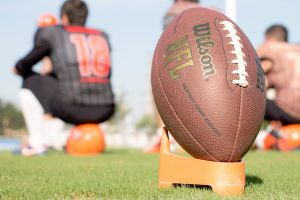How Ethics Could Help the NFL Spark Social Change

While many often turn to sports to enjoy a break from political discord, lately the pastime seems to offer a playing field for the most pressing social and political conversations of our generation.
Last year, former San Francisco 49ers quarterback, Colin Kaepernick launched himself into the forefront of one such issue with a kneel heard around the nation. Kaepernick silently protested the pregame National Anthem in response to police brutality and racial discrimination issues — rocking the league and resulting in the player’s release from his NFL contract. Kaepernick remains out of work this season, however his charge has since been echoed in waves of demonstrations among athletes from leagues across the nation.
Fueling the movement with a series of tweets and public statements, President Trump called for fans to boycott games of kneeling NFL players, urged team owners to dismiss protesting athletes, name-called participating demonstrators and equated the movement with disrespect for the American flag. He reiterated these sentiments while rescinding an invitation to the White House made to the Golden State Warriors for their recent championship win.
In response, the hashtag #TakeAKnee was born, garnering thousands of tweets nearly overnight.
The demonstrations continue to grow as more players, even entire teams kneeled together through the anthem. Accounts of players as young as eight were reportedly kneeling in solidarity of the NFL protests.
Celebrities Stevie Wonder, John Legend, and others demonstrated their support by kneeling during recent music performances across the country.
The National Association for the Advancement of Colored People, NAACP, stepped in to advocate on behalf of players and requested a meeting with the league.
The National Football League Players Association, NFLPA, released an in-depth statement with a short video supporting player protests.
The NBA also spoke out directly condemning the president’s remarks. The Golden State Warriors issued a strong statement against the retracted White House invitation.
And still others continue to speak out against the protests. The team owners, save a few, seem to be the one group keeping quiet. And in the days following the President’s tweets, NFL Commissioner Roger Goodell released the following statement in response to President Trump’s comments:
“The NFL and our players are at our best when we help create a sense of unity in our country and our culture. There is no better example than the amazing response from our clubs and players to the terrible natural disasters we’ve experienced over the last month. Divisive comments like these demonstrate an unfortunate lack of respect for the NFL, our great game and all of our players, and a failure to understand the overwhelming force for good our clubs and players represent in our communities.”
The short response was buried in the NFL newsroom and no real corresponding comment was made publicly; no social media content follow-up, no press conference.
As public relations practitioners, it’s important to ask ourselves how our message will be perceived among strongly opposing viewpoints. Elements like timeliness, values and transparency are integral to getting in front of the issue. It’s best to begin any communications response from an ethical standpoint. Some ethical questions to consider when looking at the NFL response to this event include:
- What message is chiefly conveyed by the NFL’s response? What does it tell us — whether regarding the player protests, or directed at critics? How does it outline their values as a league?
- How has the response worked to emphasize or weaken the League’s credibility? Does the comment seem genuine?
- What, if anything, does the response tell the public about what’s being done, or what will happen?
- Which publics have the league overlooked in their response?
Amid back-to-back natural disasters, a flurry of changing high-impact social policies, national security threats and investigations and the inevitable political dissonance that comes with the changing of the guard in the White House, it’s easy to get lost in the semantics or otherwise write-off these protests. However, to dismiss the issues that surround the demonstrations would be unsportsmanlike.
Enjoying or engaging in professional sports is widely considered one of the most patriotic pastimes available. Whether or not they intended it, the league is knee-deep in a multifaceted conversation about equality and free speech. And the mere fact that these issues can be explored together in the sports arena is wildly American. But rather than skirt the controversy, the league has a chance to facilitate real social change here. However, that can only be achieved through a well-crafted, timely and values-driven response.
—
Briana Bryant is a senior at University of Alabama at Birmingham, majoring in public relations. She serves as the 2017-2018 UAB PRSSA/PRCA Chapter vice president and firm director, is a new member of the PRSSA National Industry News and Events subcommittee, and a new PRSSA Regional Ambassador.
